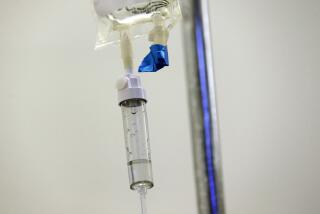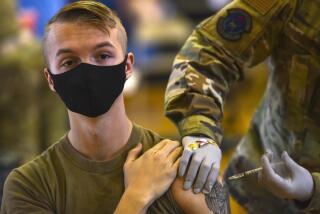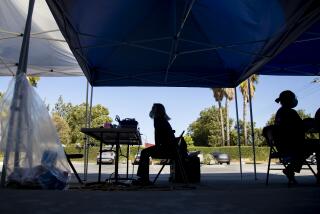War Creates Shortage of Hepatitis Vaccine : Medicine: The U.S. military’s urgent need for immune globulin in the Gulf has depleted supplies back home. It has also driven up prices.
- Share via
Supplies of the vaccine used to fight hepatitis have tightened since the Gulf War began, causing a 43% increase in retail costs.
The Department of Defense has bought more than a million doses of the hepatitis-fighting blood component called immune globulin to treat soldiers in the Persian Gulf, where the disease is widespread, the Palm Beach Post reported Thursday.
In September, the military bought all the injectable form of immune globulin then available from Pennsylvania-based Armour Pharmaceuticals.
While an intravenous form of the medicine--formed from the antibody gamma globulin--and other substances also can be used, the injectable form provides temporary protection for people exposed to unsanitary conditions or areas where the liver-attacking disease is prevalent.
Armour sold 339,000 10-milliliter vials to the Defense Department at 67.1 cents a milliliter, said Terry White, a spokeswoman for the federal Defense Personnel Support Center in Philadelphia.
Usually one vial would treat two soldiers, but in the rush to inoculate, each treated five. As a result, many have had to be reinoculated within three months instead of six months, White said.
When California-based Cutter Biological, the only other maker of the injectable form, stopped production in the fall to focus on the intravenous form of the medicine, that left only Armour to supply both the soldiers and the nation.
Armour could not come up with enough to fill the Pentagon’s immediate needs, and the National Wholesale Druggists’ Assn. scrambled to find an additional 23,000 10-milliliter vials, which wholesalers sold at cost, said Bruce Siecker, a spokesman for the Virginia-based trade group.
In the months that followed, “our wholesale members were starting to get very nervous,” Siecker said. “They were running out of available stock. We did not hear any actual incidents of people running out, but it got pretty close.”
“There definitely has been a shortage of merchandise,” said a spokesman for Gulf Distribution, a Miami-based firm that distributes the treatment throughout South Florida.
“In December and January, we couldn’t get any. I mean none,” said Bob Winship, a pharmacist at Medical Arts Pharmacy in downtown West Palm Beach.
“The doctors were crying their eyes out for it,” Winship said. “They said they had to have it for their patients.”
Most doctors had some in backup and eked through the crunch, Winship said.
Since then, Armour has gone to round-the-clock production, spokeswoman Jane Green said. Added labor costs have caused price increases, she said, although she would not discuss them.
But Medi-Span, an Indianapolis-based drug price monitoring firm, said the price a retailer would pay a distributor for a 10-milliliter vial rose in January from $1.21 per milliliter to $1.75. The increase was the first since it rose from 75 cents in 1982, Medi-Span said.
More to Read
Sign up for Essential California
The most important California stories and recommendations in your inbox every morning.
You may occasionally receive promotional content from the Los Angeles Times.













